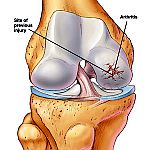Peking University, Nov. 19, 2010: Umbilical cord stem cells may be useful in the treatment of rheumatoid arthritis (RA), a Peking University-led research team has recently discovered.
Animal and in vitro experiments, described in the Nov. 16 issue of the journal Arthritis Research and Therapy, have shown that mesenchymal stem cells (MSCs) taken from umbilical cord blood can suppress inflammation and attenuate collagen-induced arthritis.
Prof. Li Zhanguo worked with a team of researchers, from Peking University People’s Hospital and Third Hospital, to carry out the study. “Very little is known about umbilical cord MSCs, and there has been no previous report about their use in the treatment of RA. MSCs can exert profound immunosuppression, which encourages their use in the treatment of autoimmune diseases, such as RA. At present, the most common source of MSCs has been bone marrow."

"However, aspirating bone marrow is an invasive procedure and the number and the differentiating potential of bone marrow MSCs decrease with age. In contrast, the collection of umbilical cord MSCs does not require any invasive procedure,” said Prof. Li.
The team also includes Liu Yanying, Mu Rong, Wang Shiya, Long Li, Liu Xia, Li Ru, Sun Jian, Guo Jianping, Zhang Xiaoping, Guo Jing, Yu Ping, and Li Chunlei from Department of Rheumatology and Immunology, PKU People's Hospital, Liu Xiangyuan from Department of Rheumatology and Immunology, PKU Third Hospital, Huang Zhenyu and Wang Dapeng from Department of Gynecology and Obstetrics of the People's Hospital, and Li Hu from Arthritis Clinic and Research Center of the People's Hospital.
The researchers took immune cells from RA patients and showed that the umbilical MSCs were able to suppress the cells’ proliferation, invasive behavior and inflammatory responses. Systemic infusion of the umbilical MSCs into mice was shown to significantly reduce the severity of collagen-induced arthritis.
Speaking about the results, Prof. Li said, “RA imparts a massive burden on health services worldwide and none of the currently used agents reaches long term drug-free remission. Therefore, a new and more effective therapy for RA will be very welcome.”
Edited by: Jacques
Source: BioMed Central